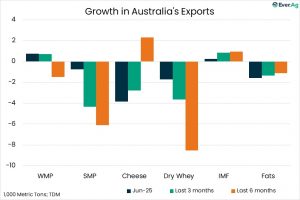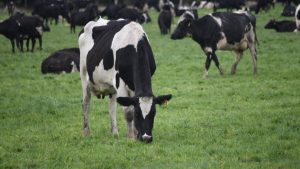
Staples such as milk, butter, cheese and yogurt could be the next in line to steeply rise in price as the effects of a dairy global shortage loom for Australia.
Inflation, power prices, drought, floods and fertiliser costs have put a squeeze on supply, the Victorian Farmers Federation (VFF) said on Thursday.
It also cited farmers’ struggles with land acquisition and irrigation access as issues compounding their efforts to bring popular dairy products to consumers’ tables.
A spokesman from VFF told Daily Mail Australia the floods in NSW and Queensland haven’t helped the problem as they ‘destroyed large areas of prime producing farmland’.
The result is less produce available on supermarket shelves.
‘The less we have of a product, the more in demand it is and this is when we see prices rise,’ the spokesman said.
The problems presented by the weather have combined with an unprecedented rise in fertiliser costs for the industry, giving farmers no choice but to pass those costs on.
‘Fertiliser is a major input cost … and is needed to produce the volume of food we create,’ the VFF spokesman said.
‘The more prices rise, the more farmers must absorb these costs that are inevitably passed onto consumers.’
Global fertiliser costs have gone up almost 30 per cent since the start of the year following a price hike last year of a whopping 80 per cent, the World Bank said last month.
It also said concerns about fertiliser affordability and availability had been amplified by the war in Ukraine.
Supply disruptions had also been worsened by sanctions on Russia and Belarus, as well as the export restrictions in China.
The normally low cost of Urea – the most common fertiliser on the market – has surpassed its 2008 peaks to cost almost $1,300 per ton – compared to $200 in 2016.
Farmers have also copped more pain with restricted access to irrigation amid drought conditions in southern parts of the nation since December last year.
The Bureau of Meteorology said on Tuesday there were ‘serious rainfall deficiencies’ continuing in southeast South Australia, southern Victoria and Western Tasmania.
Dry conditions can drive up feed and water prices for dairy farmers, as well as deplete water stores for animals.
‘Fertile, well-watered farming land produces the best and the most farming produce. The less of this type of land available, the less produce the agriculture industry produces,’ the VFF spokesman said.
The dairy food price hike warning comes after supermarkets reported record price rises for groceries especially canned goods, soft drink and coffee.
Aussies are also seeing the cost of living skyrocket, with weekly bill totals on the up.
Australian families are spending $1,770 a week on essentials with their transport costs surging by 12.9 per cent during the past year – double the already high inflation rate.
In the year to March 2022, inflation surged by 5.1 per cent, the fastest pace in 21 years, with the International Monetary Fund speculating on whether it will keep climbing.
An IMF report from last April said: ‘Standard economic theory states that inflation will get out of control under a prolonged mix of certain monetary and fiscal policies, but whether inflation will persist toward that end warrants further examination.’
The big four banks announced they will pass on the full interest rate hike announced on Tuesday to home loan customers, causing household mortgage bills to soar.
The Reserve Bank said there would be a 50 basis point jump in the cash rate pushing it up from 0.35 per cent to 0.85 per cent – the largest monthly increase in 22 years.
To tackle the power cost pressures the new Labor government is urging coal power plants to increase output as soon as possible as the east coast shivers through a freezing winter and global gas prices soar.
The Greens have argued this is the wrong approach and have instead called for a massive and rapid investment in renewable energy to get to net zero carbon emissions by 2035.
But former deputy prime minister Barnaby Joyce said Australia’s actions will make no difference to global temperatures given both China and India are pushing ahead with more coal power.
‘China’s had record production of coal in the past two quarters. If Australia were to disappear off the face of the earth, China would cover for us in about a month,’ he told Daily Mail Australia this week.

























